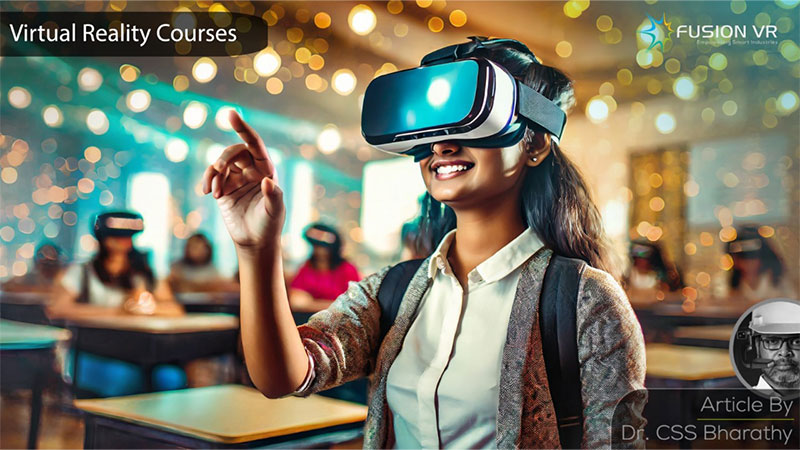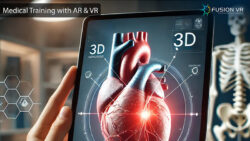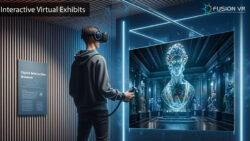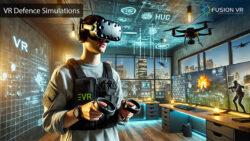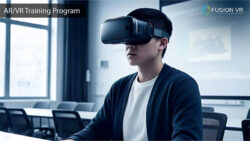The world of engineering professionals is getting introduced to a new category of engineers called VR AR Engineers. The demand for such engineers is at an astonishing rate of 1400% which means that 14 more engineers are needed for every VR AR engineer currently needed by the industry. The demand points to the tremendous growth of VR AR applications across the world. These applications are being developed for almost every conceivable industry in addition to the gaming and entertainment industries.
A VR AR engineer is a highly skilled professional tasked with the responsibility of designing, developing and implementing VR and AR applications that deliver high-quality immersive and interactive experiences. These engineers are a unique breed in that they come armed with a combination of technical expertise and creative skills that are needed to deliver sophisticated VR AR solutions in collaboration with subject matter experts.
The path to becoming a VR engineer is no longer a difficult one. A simple Google search would immediately display hundreds of results of AR VR Training companies and the VR design courses they offer. This can be quite confusing to anyone aspiring to pursue vr courses. Making a bad choice could lead to unfulfilled learning objectives and loss of money. One needs to do a fair bit of research and also talk to industry professionals to understand the skills that are currently in demand and the courses that offer the right curriculum that provide those skills.
Top virtual reality courses develop the technical proficiency that is needed for a VR developer. The most important being the programming skills that develop proficiency in languages like C#, C++, JavaScript etc. The curriculum would also include gaining competency in 3D modeling and design which are obtained by learning tools such as Unity, Unreal Engine, Blender, Maya etc. The training program would enable students to gain experience in Software Development Kits (SDK) and Application Programming Interfaces (API) that are specific to VR platforms. It is also important that students gain a strong foundation in the working principles and construction of VR hardware components such as headsets, sensors, and controllers.
In addition, students must be taught how to conceptualize and design immersive user experiences. They must also learn how to adopt a user-centric approach by designing interactive and user-friendly interfaces. Students gain troubleshooting skills while doing projects and internships at selected companies. During such internships, students work under industry experts and mentors and also stay updated on the latest industry trends and new product developments.
The top virtual reality courses are the ones that land you the best opportunities in the industry. There are different types of courses to suit the needs of students. While degree programs and specializations are being offered across many institutions, it is prudent to examine the details of what is being offered and the placement support being provided. The placement is often dependent on the networks the institution has with the industry fraternity. Fusion VR has been a pioneer in the field of virtual reality solutions and experiences for more than a decade. As a company, we have evolved and grown along with the growth of the virtual reality industry here and abroad. We are fortunate to have had a ring-side view of the industry developments and the demand for virtual reality talent. We also understand the type and depth of skills needed to develop great virtual reality solutions and execute virtual reality experiences in a wide spectrum of industries.
We recognized the need for quality virtual reality developers to support the growing demand from the industry. We also felt the need to address this demand so that we can contribute towards the betterment of the industry as a whole. To this end, we have partnered with ARK Info Solutions Pvt. Ltd and ushered in the Industry Academic Alliance Program (IAAP) for institutions across the nation. This is an initiative that helps institutions offer courses that groom engineering students and professionals with the skills needed to be successful in the virtual reality industry as developers and VR engineers. It focuses on establishing Extended Reality (XR) partnerships, VR training and research programs within colleges, universities and other institutions to ultimately deliver excellent education and employment opportunities. Our goal is to rapidly start and expand the VR and AR programs at the institution’s campus and seamlessly integrate them with the institution’s existing programs. We have a job-ready VR AR curriculum and diligently train the institution’s faculty to effectively deliver the course content and achieve the learning objectives identified in the curriculum. Fusion VR also offers to establish the necessary VR AR lab infrastructure and provides the technical support and knowledge base to build, operate and maintain the lab at a reasonably low cost.
The IAAP program provides institutions with the capability to offer their students the opportunity to obtain a major, minor or honours degree program in addition to diploma and VR certification programs. This broad offering helps students and young professionals choose the program that best suits their academic and professional aspirations the most. Probably the most important aspect of this program is to learn virtual reality in an environment that they are comfortable in and provides the maximum support from the faculty and administration staff.
The VR AR industry is growing at a breathtaking pace and the value of the global virtual reality market size in 2022 is estimated to be $19.44 billion. Furthermore, the VR industry is projected to grow to about $165.91 billion by the year 2030. The growth is driven by the manufacturing of VR hardware and accessories along with the growth of services and projects for many industries and service sectors of the economy. Virtual reality is being actively adopted in many industries across the world. It is also being viewed as a game-changer and something that will provide companies with a competitive edge in the marketplace. It is now widely used in the gaming, entertainment, training, education, medical, healthcare and manufacturing industries, to name a few. The future of the internet is the metaverse and one of the key technologies supporting its development is virtual reality. These trends have caught the attention of several institutions across the nation and they have adopted the IAAP to meet the needs of their students and take advantage of the opportunities out there. We encourage you to explore our dedicated webpage for the Industry Academic Alliance Program to learn more about it and initiate inquiries with our dedicated staff. The program has been welcomed by the administrators, faculty and students across these institutions and we are proud to continue to extend our service to them and many more.

